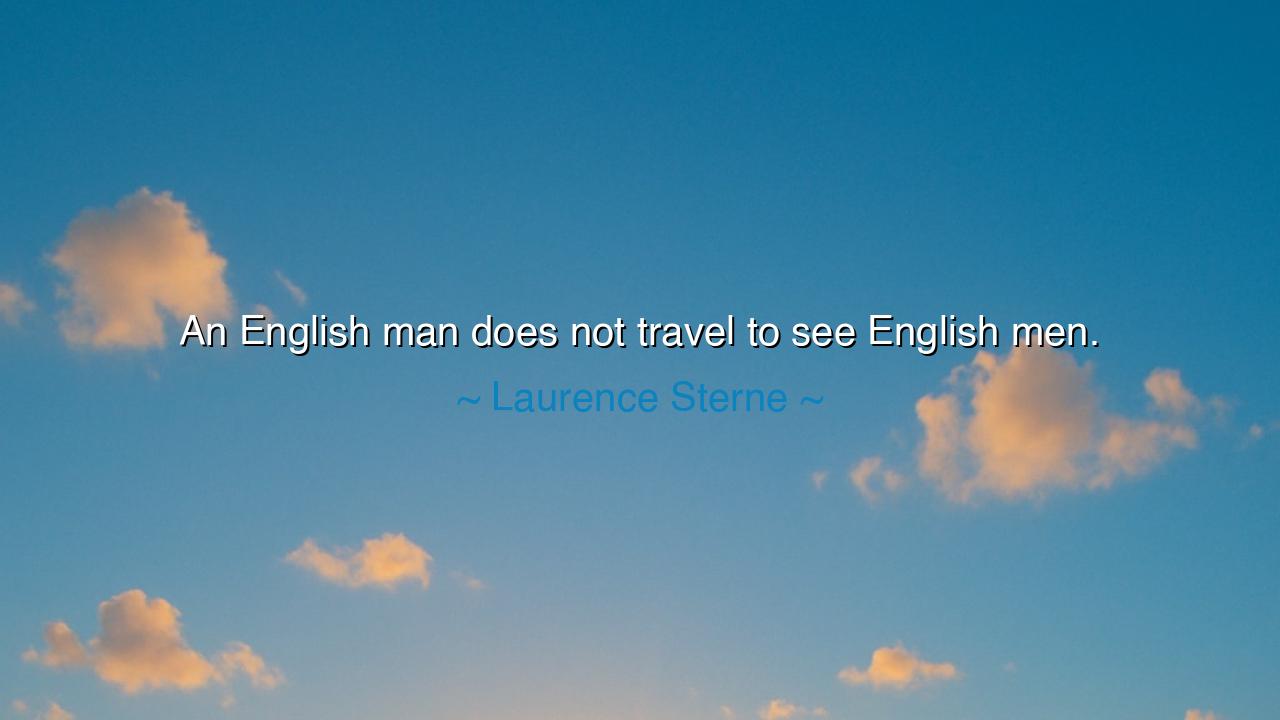
An English man does not travel to see English men.






In the words of Laurence Sterne, the wandering philosopher and teller of tales, we hear this saying: “An English man does not travel to see English men.” Though spoken with the wit of the eighteenth century, it carries within it a lesson that is timeless, a truth that burns as brightly today as it did in his age. For what is travel, if not the great school of the soul? And why does man set forth across seas and mountains, if not to seek what is foreign to his eyes, unknown to his spirit, and enriching to his heart?
When Sterne proclaims that a man does not travel to meet his own kind, he reminds us that familiarity is not the purpose of the road. One can meet those who share one’s language, one’s customs, and one’s thoughts in the taverns and hearths of home. The journey calls us, not to repeat what we already know, but to break the shell of comfort and taste of the strange. It is in difference, not sameness, that the soul expands. To travel and seek only one’s own kind is to defeat the very purpose of the road—it is to build fences in the very fields where one came to be free.
Consider the tale of Herodotus, father of history. He did not travel through Egypt, Persia, and Babylon to sit among Greeks alone, but to behold the mysteries of pyramids, to record the customs of Persians, to marvel at the rites of distant lands. From his courage to step among the unfamiliar, a treasury of wisdom was born, preserved for centuries to enlighten mankind. Had he clung only to his fellow Greeks, the world’s vastness would have remained veiled in shadow.
So too, in our modern age, many journey but few truly travel. The traveler who goes abroad only to eat the food of his own homeland, to hear his own tongue, and to sit among his own people has wandered in body but not in spirit. He has carried his home upon his back like a snail, never truly leaving it. Sterne’s words are a rebuke to this false travel, reminding us that the road exists to transform us, not merely to entertain us.
Yet let us also honor the danger in the strange, for it is not always easy to walk among those who are unlike ourselves. The customs of others may confound us, their tongues bewilder us, their ways unsettle us. But herein lies the heroism of travel: to endure discomfort, to embrace humility, to become a student once more. Just as the warrior grows strong through trials, so the traveler grows wise through the challenge of the unfamiliar.
The lesson, then, is clear: when you set forth, seek not what is already yours. Speak with those whose tongues stumble against your ear. Share food with those whose flavors surprise your palate. Walk in temples, markets, and streets where your heart beats with wonder, not certainty. For the true reward of travel is not distance crossed, but horizons widened.
Therefore, O seeker of wisdom, let Sterne’s teaching be your guide: “An English man does not travel to see English men.” In your journeys, whether across seas or within the boundaries of your own city, remember always to step beyond the familiar. In doing so, you will not merely see the world—you will see yourself reflected anew in the faces of strangers, and you will return not the same as when you left, but richer, fuller, and more deeply human.
And so, let the action be this: when you next travel, resist the urge to cling to what you know. Instead, lean into the strangeness, for it is there that wisdom awaits you.






AAdministratorAdministrator
Welcome, honored guests. Please leave a comment, we will respond soon